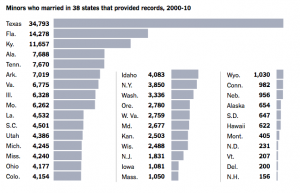
The failure of the bill to protect kids draws national scrutiny
By Eric Valentine

From celebrity TV judges to national religious websites, the decision by lawmakers to kill the bill that would have ended child marriage in Idaho has been drawing shock and scrutiny far beyond this Pacific Northwest state. Newsweek Magazine, in their online headline, made it clear that a “Republican Controlled [Congress]” blocked the legislation, but in fairness it should be noted 14 Republicans joined the 14 Democrats who supported the bill. The bill, sponsored by Rep. Melissa Wintrow (D-Boise), ultimately failed on a 28–39 vote.
So how did a bill aimed at protecting kids in a family-friendly state get shot down? It depends on who you ask.
For Wintrow, it all comes down to not taking the protection of children seriously enough.
“The existing law has loopholes that allow for someone to commit rape or statutory rape and not be charged,” Wintrow said. “The state is complicit in setting the stage for an opening for coercion and abuse of our children.”
For other legislators, it comes down to trusting that parents and judges will make a better decision on behalf of children than a generic law.

Rep. Christy Zito (R-Hammett) pointed to the irony that the legislation would make it easier to obtain an abortion at 15 years old than it would be to marry and form a family. Rep. Julianne Young (R-Blackfoot) told fellow lawmakers that existing law allows families to decide if their child is ready for marriage and that that was sufficient.
And then there were the more nuanced opinions, like that of Rep. Bryan Zollinger (R-Idaho Falls), who voted against the bill.
“I’m actually open to a cutoff age. Kids in Idaho need protection, but this bill was just too broad in scope,” Zollinger said.
Specifically, Zollinger did not like that the new law would have required 16- and 17-year-olds to get permission from both a parent and a judge. Currently, they would only need parental consent.
“I don’t think government should be in the marriage business,” Zollinger said. When asked if that applied to same-sex couples and people who want multiple spouses, he paused.
“It’s a broad statement I’m making but in general it should apply to all individuals. I haven’t thought about how that would apply to people who want to marry more than one person,” Zollinger said. “My vote against the bill didn’t have to do with the 16-year limit, it had to do with 16- and 17-year-olds requiring permission from an already overloaded judiciary. They already require parent permission.”
But for lawmakers like Wintrow, and for child advocacy groups, certain realities cannot be overlooked. Reality number one: Almost all of the child marriages were girls wed to adult men, according to Unchained At Last, a leading anti-child-marriage organization. Another reality, the group says, is that when girls marry underage, their likelihood of living in poverty and not getting an education increase dramatically.
Patheos, an online religious magazine, penned an editorial about the Idaho Legislature’s vote. In it, the author concludes, “There is no world in which it makes sense to me for a 15-year-old to get married, but here’s the rub—conservatives disagree. If a 15-year-old is pregnant, they really do think it is better for her to marry than either have an abortion or bear a child out of wedlock. Their opposition to bans on child marriage is not so much that they don’t think girls are pressured into marriage as children as it is that they think pregnant girls should be pressured into marriage as children.”
From 2000 to 2010, more than 4,000 children under 18 married in Idaho. And for now, existing law allows children under 16 years of age to marry so long as they have both the consent of a parent and a judge. In court, it must be shown the child is fit for marriage and that marriage would be in the benefit of society at large.


